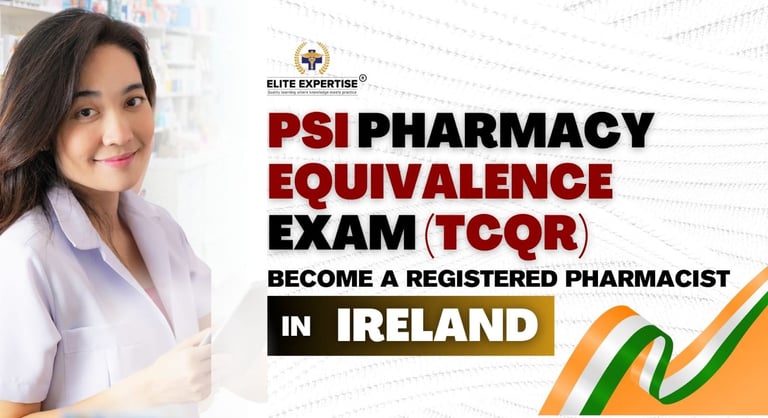ASK MY PHARMACIST | GOT QUESTIONS? Your pharmacist has answers. Click Here
How to become a registered pharmacist in Ireland with PSI Pharmacy Equivalence Exam (TCQR) in 2025
Understand the details about the PSI Equivalence exam and register in Ireland, which includes eligibility, holistic assessment process, exam patter and FAQs
Krupa
8/28/20254 min read


PSI Pharmacy Equivalence Exam (TCQR)Become a Registered Pharmacist in Ireland
Key takeaway
The PSI Pharmacy Equivalence Exam (TCQR) is mandatory for non-EU trained pharmacists, including Indian graduates.
The process of PSI examination for overseas pharmacists has several steps.
eligibility check
application submission
holistic assessment
equivalence exam (if required)
registration.
The PSI examination consist two stages, MCQ and OSCE exam is the parts of the equivalence examination
Successful completion allows you to work as a pharmacist in Ireland and opportunities across the EU.
For an international pharmacy graduate who wishes to work and settle in a developed country, Ireland is one of the top choices. Due to its developed healthcare system, global recognition in the pharma industry, and wide career opportunities it is always an attractive place for pharmacy graduates. If you are an Indian pharmacist (or a graduate from another non-EU country). Overseas trained pharmacists cannot directly register with the Pharmaceutical Society of Ireland (PSI).
They must complete the Third Country Qualification Recognition (TCQR) process, which includes the PSI Equivalence Examination.
This exam will prove the qualification, skills, and training match the Irish standards of an overseas pharmacist for safe pharmacy practice in Ireland. In this guide, we’ll discuss the process involved, eligibility criteria, documents assessments, and equivalence exam to clear. These are the important things that a student should understand who wish to become a registered pharmacist in Ireland
What are the steps to become a registered pharmacist in Ireland?
1. Eligibility Check with the skills and qualification
pharmacy graduates from EU/Non EU countries should have the following to be eligible:
candidates with a Bachelor of Pharmacy (BPharm), Master of Pharmacy (MPharm), or PharmD from a recognised institution in India
Candidates must have an Active Registration with the home country pharmacy council
Candidates have to clear the English Language Proficiency test with desired score. The accepted tests are IELTS Academic, TOEFL iBT, Cambridge Advanced English (CAE), or OET Pharmacy.
2. Candidates can apply for stage 1-Qualification Recognition
The first step is submitting an application to PSI. This comes under the Recognition of Non-EU Qualification process candidates.
This is mandatory for all pharmacists trained outside the EU/EEA.
Documents required for the application is:
Academic transcripts of the qualification that candidates have
Degree certificates from universities
Proof of registration as a pharmacist in the home country
Copy of Passport
If candidate has any experience, they has to showStatement of professional experience
There are certain categories of documents that applicants have to fill and submit for this process. They are:
Form for TCQR1 – Application Form
Form for TCQR2 – Statutory Declaration Form
Form for TCQR3 – Certificate of Identity Form
Form for TCQR4 – Regulatory Data Form
3. Holistic assessment (Verification Process)-stage
Once candidates submit the required documents, PSI conducts a holistic assessment. It is done by external assessors such as Independent agencies. It consists of three components:
Input Component – this component Evaluates the academic qualification and training done by the candidate.
Quality Component – they review the accreditation and quality of the candidate's qualification.
Output Component – will check the postgraduate education, work experience, and continuing professional development (CPD).
After this verification is done, based on the results, candidates are categorised as:
Path A (Automatic Recognition): it's veryRare for non-EU qualifications. Usually this path is for students from Canada, USA or the UK
Path B (PSI Equivalency Exam Pathway): Most Indian pharmacists must take this route.
4. PSI equivalence examination stage: Path B
This examination is conducted to identify the gaps between the skills and knowledge of overseas trained pharmacists with that of Irish standards
There are two parts of the examination. They are:
Multiple choice questions(MCQs)
Its computer based exam
Conducted online
The exam syllabus covers the basic of pharmacy topics such as Pharmacology, pharmaceutics, clinical practice and Irish law
Objective Structured Clinical examination (OSCE)
It is a practical exam which is based on stations with examiners
This exam tests the clinical decision making skills, communication and problem solving through the real life scenarios
5. Final registration & Certification
After clearing all exams and assessments, candidates can apply for full registration with PSI. Once registered:
After clearing this examination, applicants can legally practice in Ireland as a registered pharmacist.
Candidates can directly access job opportunities in community pharmacy, hospital pharmacy, industry, and academia sectors.
Applicants can opt for EU migration under mutual recognition agreements.
Refer to:

Conclusion
To become a registered pharmacist in Ireland, for an Indian and other non-EU pharmacists, it requires structured preparation and guidance for completing the PSI Pharmacy Equivalence Exam (TCQR). The process involves an eligibility check, application submission, holistic assessment, PSI equivalency exams (MCQ & OSCE), and final registration.
The preparation can be overwhelming for the international students. It can be a time consuming process, but it will give rewarding results for the students. Clearing the exam will make candidates with a license that allows them to build a successful pharmacy career in Ireland. Candidates with strategic preparation, proper documentation, and commitment, will increase the chances to become a PSI-registered pharmacist in Ireland with confidence.


About the Author
Krupa Karamchand
Content Writer | Elite Expertise
Krupa Karamchand is a B. Pharm graduate and KAPS-qualified pharmacist with over 7 years of experience in the pharmaceutical field. As an experienced SEO content writer, she combines her in-depth healthcare knowledge with proven digital strategies to create informative, engaging, and search engine–optimized blogs. Krupa is passionate about making complex medical topics easy to understand and accessible to all readers.
Follow On
Follow Us
+91 76750 84909
Privacy Policy | © 2025 Elite Expertise . All Rights Reserved.
ELITE EXPERTISE PTY. LTD (ABN: 15668292439) (ACN: 668292439)
Australian Statutory Education License: OPP 2025 ELITE EXPERTISE PTY. LTD
Disclaimer
Elite Expertise is an online education platform dedicated solely to providing coaching and preparation services for the OPRA, PEBC, PSI and PTE exams. We do not offer any sponsorship or migration services. All information provided on our platform is for educational purposes only and should not be interpreted as legal or immigration advice. For inquiries regarding sponsorship, visa applications, or migration services, please consult with licensed immigration professionals or relevant authorities.
Elite Expertise is a trusted and results-driven training platform specializing in preparation for international pharmacist licensing exams. Our comprehensive courses, expert instructors, and proven methodologies have helped countless pharmacy professionals achieve their goals and succeed in competitive regulatory exams. We are proud of our strong success rate and commitment to excellence.
Elite Expertise is an independent training provider. We are not affiliated with any global pharmacy regulatory authorities or official exam-conducting bodies.
Copyright © 2026 Elite Expertise. All rights reserved.
Address
Unit 1/73 Beverley St, Doncaster East VIC 3109, Australia
